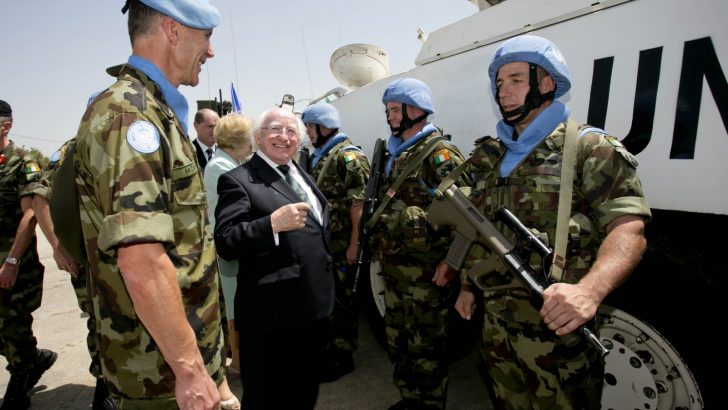Joe Carroll
Irish troops have been involved in United Nations peacekeeping missions for 60 years at a cost of 86 lives. It is an honourable record and the author, a former Lieutenant Colonel in the Defence Forces, has played his part.
In his new book he writes about the Irish role in these missions and concentrates on seven episodes where Irish troops had to resort to armed action as part of their mission. These include in the Congo, Lebanon, Kosovo, Chad and Syria.
The most tragic episode was at Niemba in the Congo in November 1960 where nine Irish soldiers died when ambushed by Baluba tribesmen. It was a rough wake-up call for the Irish peacekeepers caught in a chaotic situation in the breakaway province of Katanga. It was also a shock for the public at home which a few months earlier had seen the photographs of smiling soldiers boarding the US transport planes ferrying them to the Congo.
Action
Further action followed at Jadotville and the ‘tunnel’ in Elizabethville, but the Irish learned fast and won a high reputation for diplomatic as well as military skills by the time the Congo operation ended several years later.
Their future missions were complicated by the UN mandates they operated under in which their entitlement to use force was never clearly spelled out. The distinction between ‘peace enforcement’ and ‘peacekeeping’ remains a subtle one, perhaps too subtle.
As peace enforcers, UN troops can engage opposing forces to win military objectives as happened at Elizabethville but after the Congo, UN mandates usually restricted the use of military force to self-defence situations.
This was a tricky one for the Irish troops patrolling the infamous ‘enclave’ on the border between Lebanon and Israel as part of UNIFIL from 1978.
Here the Irish and other peacekeepers were squeezed between the exiled Palestine Liberation Organisation, the Christian militia under the renegade Major Haddad and the trigger-happy Israeli forces. These were ready to make forays into the enclave when under rocket fire from the PLO. Between 1978 and 2000 some 46 Irish peacekeepers died on duty in the Lebanon.
An interesting variation on the classic UN mandate mission was the Irish contribution in Chad in 2008 as part of EUFOR set up by the EU under the European Security and Defence Policy.
The civil war in Chad was threatening to lead to the deaths of hundreds of thousands of refugees in isolated desert camps run by NGOs (non-governmental organisations). EUFOR, commanded from its headquarters in Paris by the Irish officer, Lt-General Pat Nash, was tasked to protect the camps until a UN police force would arrive.
The author describes how the Irish Rangers contingent had to operate in desert conditions, thousands of kilometres from reinforcements of equipment.
In a contribution to this book, General Nash concedes that in certain situations, EUFOR “was morally bound to intervene and did even though it was neither mandated nor structured to do so.”
This is a blunt comment on the ambiguity of some UN Security Council mandates and the problems it can pose for both the troops on the ground and their governments.


 President higgins meeting members of ireland's UN peacekeepers
President higgins meeting members of ireland's UN peacekeepers 